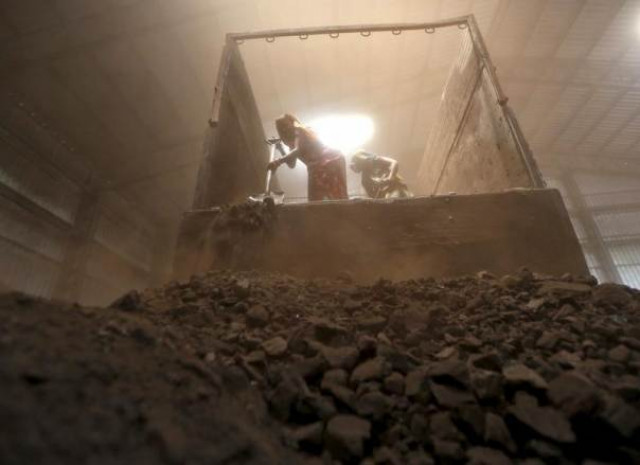India opposes deal to phase out fossil fuels by 2100 at climate summit
India in October committed to slow the rate of growth in its carbon output by a third over the next 15 year

Workers unload coal from a supply truck at a yard on the outskirts of the western Indian city of Ahmedabad April 15, 2015. PHOTO: REUTERS
Almost 200 nations will meet in the French capital on Nov 30 to try and seal a deal to prevent the planet from warming more than the 2 degrees Celsius that scientists say is vital if the world is to avoid the most devastating effects of climate change.
To keep warming in check, some countries want the Paris agreement to include a commitment to decarbonise -- to reduce and ultimately phase out the burning of fossil fuels like coal, oil and gas that is blamed for climate change -- this century.
Over half of world's primates on brink of extinction: experts
India, the world's third largest carbon emitter, is dependent on coal for most of its energy needs, and despite a pledge to expand solar and wind power has said its economy is too small and its people too poor to end use of the fossil fuel anytime soon.
"It's problematic for us to make that commitment at this point in time. It's certainly a stumbling block (to a deal)," Ajay Mathur, a senior member of India's negotiating team for Paris, told Reuters in an interview this week.
Paris climate conference: Preparation of INDCs difficult, tricky process, says Ambassador Lacoste
"The entire prosperity of the world has been built on cheap energy. And suddenly we are being forced into higher cost energy. That's grossly unfair," he said.
Mathur said India, whose position at climate talks is seen by some in the West as intransigent, was committed to the 2 degrees ceiling as a long-term goal and was confident a deal would be reached.
But he said Prime Minister Narendra Modi's government wanted an agreement that required countries like India to do more over time as they become wealthier, rather than an "ideology-driven process" committing everyone to ending carbon usage.
India also wants to see rich nations' pledges to cut greenhouse gas emissions subjected to tougher reviews than those of developing nations, and Mathur warned against an "external penal regime that will only turn people back".
India, whose 1.2 billion people produce far lower emissions per capita than the world average, in October committed to slow the rate of growth in its carbon output by a third over the next 15 years.
While the pledge was welcomed by some environmentalists, others worry that India's huge population and rapid industrialisation mean heavy future use of carbon will tip the balance in the global fight against climate change.



















COMMENTS
Comments are moderated and generally will be posted if they are on-topic and not abusive.
For more information, please see our Comments FAQ